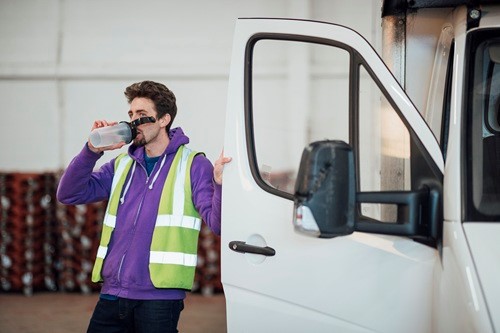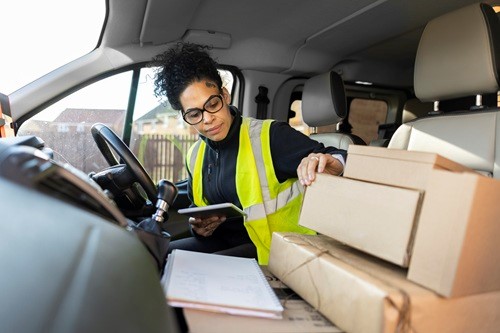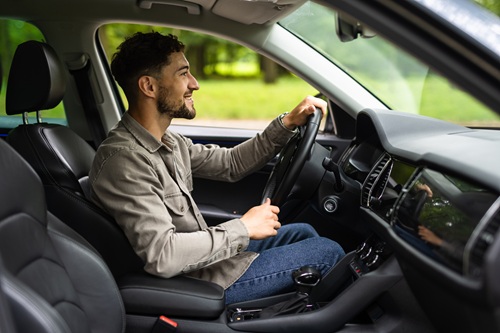Mobile workers often struggle to access clean and safe welfare facilities when out on the road, but a new app-based initiative aims to overcome this perennial problem by pairing accommodating venues with workers.
Features
8 million UK mobile workers lack basic amenities – and it’s not OK
A familiar scene
Sam is a hardworking maintenance engineer spending their day moving from site-to-site, completing job after job. It’s important but tiring work, made only more gruelling by trying to balance between staying hydrated and frequent toilet stops.
The initial pang from Sam’s bladder is accompanied by a shudder of dread. Sam doesn’t know this area well and has no idea where the nearest toilet could be. Even if there is one, will it be open? Will it be clean? Sam has heard countless stories of colleagues having to use bottles in the back of their van in desperate times, but Sam does not want to have to resort to this.
Sam could visit a local cafe but has already spent a lot of money this week on unwanted drinks and snacks, just to feel less awkward using the facilities.
For countless mobile workers across our country – from delivery drivers to emergency service workers – this is a common and uncomfortable scenario.
 Many mobile workers avoid drinking a lot of fluid in an attempt to avoid the problem of locating a toilet. Photograph: iStock
Many mobile workers avoid drinking a lot of fluid in an attempt to avoid the problem of locating a toilet. Photograph: iStock
Scale and why it matters
Across the UK, an estimated eight million mobile workers, like Sam, spend their days on the road without ready access to clean water, a toilet and a safe place to rest; basic needs that many office workers take for granted. Ever sat through an hour-long meeting, counting down the seconds so you can make a beeline to the restroom to relieve yourself? Well imagine that feeling, but not even knowing if and where a restroom is available.
These basic amenities are not just a matter of convenience; many well researched and peer-reviewed studies clearly show that a lack of access to adequate welfare facilities has a huge negative impact on the UK’s mobile workforce.
The impacts include:
- Dehydration – many mobile workers spend their days avoiding drinking fluids in an attempt to avoid the problem of locating a toilet. In the short term, dehydration causes fatigue, musculoskeletal strain, lack of focus and tiredness.
- Productivity – many workers lose valuable time searching for adequate rest places, which can cause significant delays to work schedules and increase overall costs for the business. Workers commonly report losing 20 to 30 minutes a shift, just searching for a toilet or a place to rest while on the road.
- Retention and morale – workers who feel neglected and struggle through their work shifts are far more likely to leave the business; leading to higher recruitment costs in order to replace the departing employees.
- Safety – tired or distracted drivers are significantly more likely to have accidents or near misses.
Given the sheer scale of the UK’s mobile workforce, the aggregate cost to both worker wellbeing and the economy due to poor or non-existent access to suitable welfare facilities –although hard to quantify – is clearly significant.
Legal and moral duties
So, clearly there is a problem and it is a very common one. But what does the law require employers to do in terms of ensuring their employees have access to suitable welfare facilities, like toilets, hand washbasins and drinking water?
Well, employers are legally required to provide basic welfare amenities for their workers under the Health and Safety at Work Act 1974. This states that every employer has a duty to ensure (so far as is reasonably practicable) the health, safety and welfare of their employees at work, including “the provision and maintenance of a working environment that is… adequate as regards facilities and arrangements for their [employees’] welfare at work”.
This duty is reinforced by the Workplace (Health, Safety and Welfare) Regulations 1992, which make it explicit that:
- Suitable and sufficient sanitary conveniences (toilets) must be provided at readily accessible places (regulation 20).
- Suitable and sufficient washing facilities with hot and cold (or warm) running water must be provided nearby (regulation 21).
- An adequate supply of ‘wholesome’ drinking water must be available for all persons at work (regulation 22).
- Suitable and sufficient rest facilities must be provided at readily accessible places, including facilities for workers to sit in a warm and clean environment and to eat meals where food can be protected from contamination (regulation 25).
 There are around eight million mobile workers who spend their days on the road without ready access to clean water, a toilet and a safe place to rest. Photograph: iStock
There are around eight million mobile workers who spend their days on the road without ready access to clean water, a toilet and a safe place to rest. Photograph: iStock
The harsh reality
Now this seems pretty cut and dry – so why is it that in reality, millions of UK mobile workers are being neglected and left behind when it comes to access to basic welfare amenities?
Why is it that Sam is seriously considering that empty bottle right now?
The truth is, there are some solutions available, but they are costly and often not fully fit for purpose. In terms of providing welfare facilities at temporary or remote worksites, such as construction sites or short-term or remote transport and distribution yards, the main options are as follows.
Portable toilets
These are usually the cheapest option and can be provided ‘in lieu’ if a site lacks permanent, fixed sanitary conveniences, connected to mains water and drainage systems. However, portable toilets (i.e. chemical toilets) are very much fixed to the location where they have been placed, meaning they can only be accessed by those workers present at – or visiting – the temporary or remote work site.
As a result, portable toilets can only serve a limited number of workers – namely those who are based at the site or visit on an ad-hoc basis. Also, maintaining the cleanliness of portable toilets can be a major challenge, and they do not usually include the provision of running water – either to flush the toilets or to provide a hand washing facility within the toilet itself. As a result, the hand washing facility is usually provided in an adjacent or nearby area.
Portable toilets certainly do not provide a clean, warm place to sit and eat food, although UK safety law requires employers to provide suitable facilities (i.e. a seating area) where workers can eat food without the risk of it becoming contaminated; and to provide a means of heating water for hot drinks and (in most circumstances) a means of heating food.
Also, although portable toilets (such as chemical toilets) can be an inexpensive option for temporary or remote work sites, they arguably don’t actually comply with the spirit of the Construction (Design and Management) Regulations 2015 (CDM). This is because Health and Safety Executive (HSE) guidance on CDM and the provision of welfare facilities on construction sites states that, wherever practicable, those in control of construction sites should provide flushing toilets and running water, connected to mains water and drainage systems.
If this is not possible, sanitary facilities with a built-in water supply and drainage tanks should be used (such as portable cabins converted into toilet facilities). The guidance concludes by stating that portable chemical toilets should only be provided as a last resort option.
Welfare cabins
These are a noticeable upgrade on portable toilets. They often feature separate toilet cabins with hand washing facilities, plus separate rest areas with seats and tables and a means of heating up food and drinks, and other appropriate welfare facilities, such as changing rooms, clothing storage lockers and showers. They generally include a means of heating both the rest facilities and the water required for washing, such as via LPG heaters. As a result, they sometimes incorporate all the welfare facilities that must be provided (where necessary and appropriate) at a construction site in line with the CDM Regulations and HSE’s associated guidance on welfare provision for construction sites.
However, the provision of heating and hot water in welfare cabins usually means that cumbersome, noisy generators need to be provided and these require regular refueling, for example, with LPG or diesel oil to power the generator. The water tanks – which provide water for flusing toilets, hand washing and showing – also need periodic refilling, and the water is not always safe to drink, meaning a separate supply of drinking water must be provided – for example, bottled water.
Welfare cabins also take up a lot of space and sometimes cause inconvenience to local residents – for example, due to noise emissions from the LPG generators. As with portable toilets, welfare cabins are simply provided at a specific work or rest site and this unfortunately means mobile teams can only access them when they visit the location, which may not be possible if they are working elsewhere or out on the road. In the summer, welfare cabins can also become unbearably hot, as only the more complex and expensive units feature air conditioning.
 Stu Drinkwater: "The UK’s mobile workforce deserves better."
Stu Drinkwater: "The UK’s mobile workforce deserves better."
Welfare vans
These are vans that contain a portable toilet and sometimes a seating area. Although they are an improvement on a static portable (chemical) toilet, a welfare van will not comply with the requirements of CDM if it does not incorporate hot and cold running water for hand, arm and face washing, and (if required), showers. Welfare vans can be easily moved, which makes them a useful option for teams who are working away from a static site.
However, a problem arises if the workers are required to spread out, and need to visit and work in different locations, away from the site where the welfare van has been parked. The employer is then faced with the challenge of where to locate the welfare van so it remains within a reasonable travelling distance and time of multiple workers based in various areas. This can be difficult and it may prove hard to please everyone, with some workers having to travel considerable distances to access essential facilities like toilets and rest areas.
Importantly, small and medium-sized businesses that employ mobile workers may not be able to afford to purchase or hire the necessary number of welfare vans to provide all staff with adequate welfare facilities, particularly if workers are regularly moving and travelling around.
 By encouraging a wide range of willing venues across the UK to join its network of ‘Welfare Centres’, Take a Leak hopes to transform the working lives and wellbeing of workers
By encouraging a wide range of willing venues across the UK to join its network of ‘Welfare Centres’, Take a Leak hopes to transform the working lives and wellbeing of workers
A simple solution
However, there’s hope for Sam and millions of other UK mobile workers, because there’s a simple solution hiding in plain sight, right in front of our very eyes. In fact, to a degree this solution is already being used, just not officially, and with extremely mixed results.
As stated, the Health and Safety at Work Act 1974 and the Workplace (Health, Safety and Welfare) Regulations 1992 set out the various welfare facilities that should be provided for employees in workplaces, and this therefore almost universally means that employees based in fixed locations have access to all the necessary basic amenities, such as toilets, a place to sit, rest and eat, and clean drinking water.
In fact, this legal requirement means that most venues that employ people and serve customers – such as cafes, pubs, restaurants, community halls and libraries – already have all the necessary welfare infrastructure in place. So, can’t we make use of this existing infrastructure? The short answer is; we can.
The freedom to Take a Leak
The innovative folks at TAL Services (aka, Take A Leak), are using emerging technology to create a win-win-win solution to the problem of ensuring mobile workers have access to suitable welfare facilities.
By encouraging a wide range of willing venues across the UK to join its fast-growing network of ‘Welfare Centres’, TAL hopes to transform the working lives and wellbeing of millions of mobile workers across the country.
The scheme is very straightforward. Using the TAL app, mobile workers can quickly and easily locate the nearest participating venue, such as a cafe or a pub. These venues offer a variety of clean and safe welfare facilities, such as toilets, washrooms, drinking water supplies and rest areas. Each time a worker uses a venue’s facilities, the worker’s employer simply pays a small free – equivalent to the cost of a cup of coffee – to the venue as a thank you.
The worker gets much needed rapid and easy access to welfare facilities, the venue earns some money and the employer has assurance they are meeting their duty of care for employee wellbeing.
Conclusion
While you have been reading this, Sam has no doubt been driving around the roads, desperately trying to find a service station or friendly cafe owner willing to grant use of their toilet and welfare facilities. Meanwhile, you may well have been blissfully reading through this article, sipping on a coffee, without a second thought for your bladder’s maximum capacity.
It doesn’t have to be this way. Clearly, there needs to be a huge cultural shift so that employers of mobile workers fully appreciate and understand the duties they have to ensure their teams can access welfare facilities on the road, quickly and safely. And for their part, mobile workers need to remind their employers that access to adequate welfare facilities is not just a matter of convenience; it’s a matter of health, safety and dignity.
As a society, we need to have a discussion about why it is important that mobile workers always have access to adequate welfare facilities. Peeing in bottles is not okay. Unzipping at an unsuspecting hedge is not okay. Turning dark alleyways into pungent urban streams is not okay. The UK’s mobile workforce deserves better, and we have a duty to keep the lifeblood of our country comfortable, motivated and healthy.
To learn more about getting involved in TAL’s initiative visit: talservices.co.uk
Stuart Drinkwater is a founder of TAl. He was recently interviewed for British Safety Council’s podcast, Health and Safety Uncut. Listen to the episode here
FEATURES

Turning sustainability compliance into business opportunity
By Alastair Loasby, Saffery LLP on 27 February 2026
Businesses that publicly demonstrate good sustainability performance can reap financial, reputational and other benefits, but it’s important to minimise the cost of any reporting on sustainability issues and to focus efforts on improving aspects of sustainability where the benefits outweigh the costs.

How to mitigate the hearing loss cost escalation tsunami
By Peter Wilson, Industrial Noise and Vibration Centre (INVC) on 06 February 2026
Employers need to adopt the latest and most effective noise risk evaluation and management measures, or face rapidly-rising compensation claims for noise-induced hearing loss at work.

Young drivers and work-related road risk: why employers must act now
By Simon Turner, Driving for Better Business on 06 February 2026
Young drivers have a higher risk of being involved in road collisions due to factors such as their inexperience, so when employing them to drive for work, it is vital they receive the right support to help them grow into safe professionals behind the wheel.



